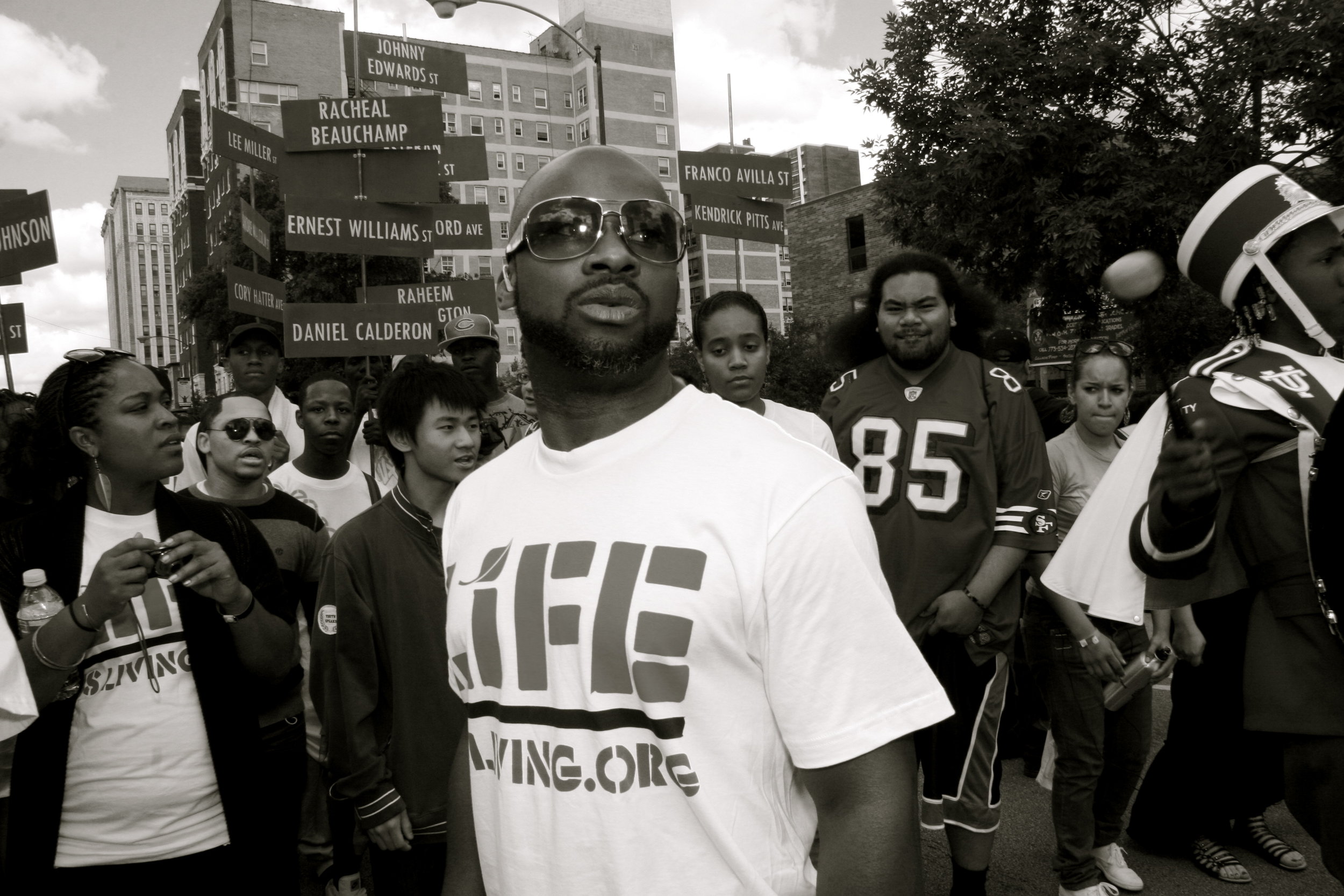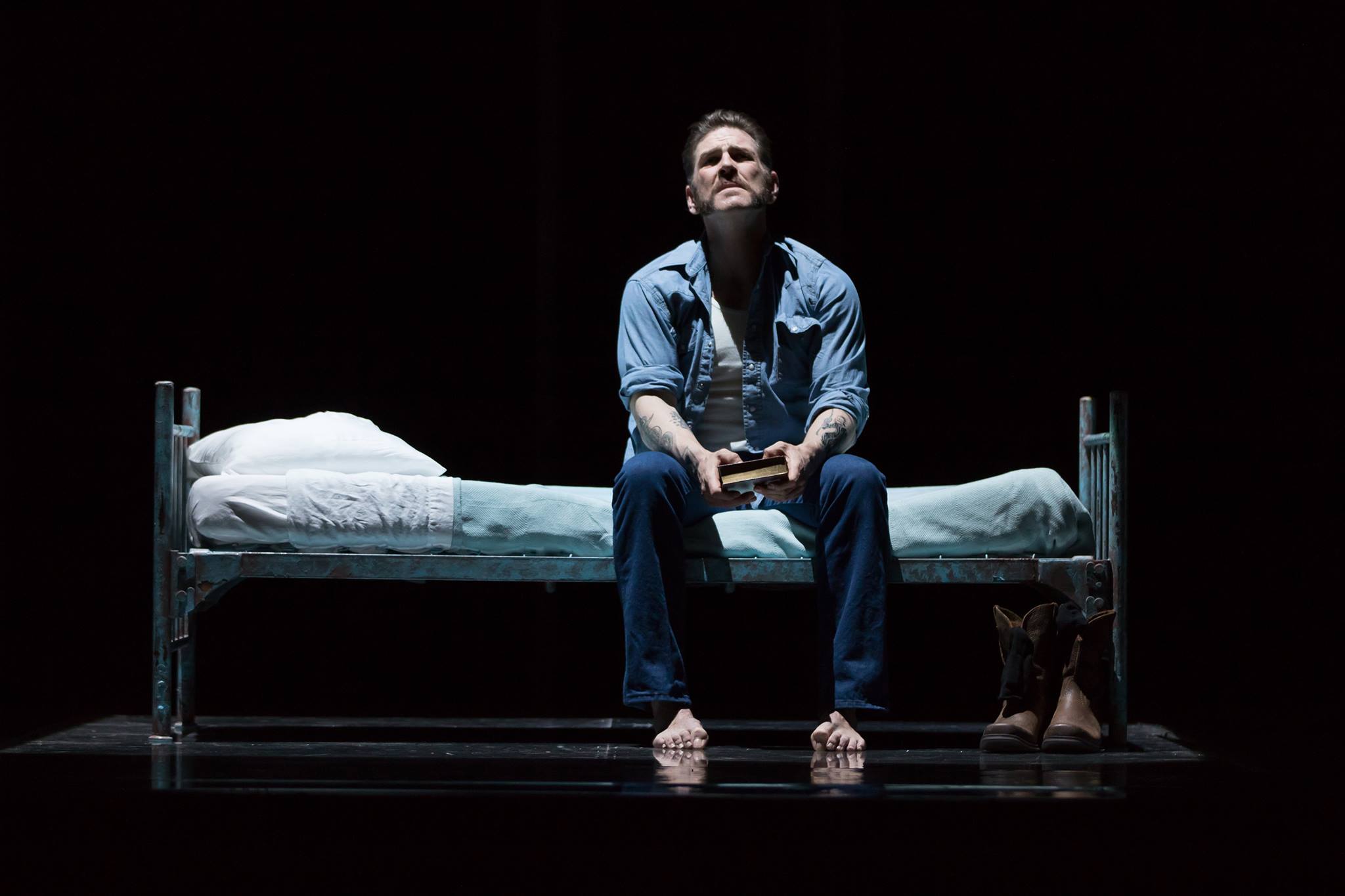Poet At Large

The work of Marc Bamuthi Joseph is exploding across American stages this fall. His name is on the libretto of an opera having its world premiere in Philadelphia, which then moves on to NewYork's Apollo Theater, followed by London; he’s curating a politically and socially engaged dance and live art festival in San Francisco; he’s the playwright/poet creator of plays being performed in Washington D.C., Chicago, and New York.
Bamuthi Joseph’s website describes him as a “curator of words, ideas, and protagonists.” He states his “theatrical signatures range from Othello to Obama.” His experience includes a 2017 TEDGlobal Fellowship, an appearance on the cover of Smithsonian Magazine as one of America’s Top Young lnnovators in the Arts and Sciences; a stint as Artistic Director of HBO’s “Russell Simmons presents Brave New Voices,” and he’s the inaugural recipient of the United States Artists Rockefeller Fellowship, which annually recognizes 50 of the country’s greatest living artists.
Born and raised in New York City, the son of Haitian immigrants went to a mostly white high school on Manhattan’s Upper East Side. He then chose Morehouse College. He’s used to having his feet and his consciousness present in more than one space, physically and mentally.
Asked to describe the different worlds he inhabits and how they impact his work, he told me
“I think like so many people that grow up in historically marginalized communities, or marginalized families, there’s a way you have to evolve a different kind of instrument for passing. I went to school in the upper east side of Manhattan. My wife’s mom is Chinese-Hawaiian from Mali. Her dad is African American from Ohio. My son’s mom is Taiwanese. My parents come from Haiti. Everyone in my family is Asian but me, but we’re all black. That’s the world that we live in. There’s a swirl of race, culture, and context -- we’ve moved too far in the American experiment to keep compartmentalizing. What my experience provides me, and what my current context provides me, is a kind of normalcy of cultural exchange and means of cultural travel and navigation.”
At YBCA in San Francisco, where Bamuthi Joseph is Chief of Program & Pedagogy, he’s unleashing the inauguration of the Transform Festival (September 14-23), through which local dance artists and companies celebrate the power of ideas. In its first iteration, Bamuthi Joseph asks the artists to respond to the question “Why citizenship?” The Transform Festival features seven newly-commissioned works from provocative Bay Area dance and ballet artists including Jesse Hewitt, Fauxnique, and RAWdance, along with labs, pop-up “activations,” dance parties, films, and the latest version of a community singing project called the 50 Cent Tabernacle.
In Washington D.C., Theater Alliance is presenting an encore run of its multiple award-winning production of Bamuthi Joseph’s Word Becomes Flesh (September 7 - October 8), a hip-hop infused theater work that goes deep in its examination of cultural and personal aspects of fatherhood and black male identity. The power of Word Becomes Flesh inspired Theater Alliance to use the play as the springboard of another festival, Word Becomes Action (September- October), which challenges other playwrights to create theater based on the African diaspora, and in post-performance discussions connects audience and non-profits to create action plans for the issues raised in the plays.
After successful runs at the Kennedy Center (which commissioned the work) and YBCA, Bamuthi Jospeh and The Living Word Project’s /peh-LO-tah/, a “futbol framed freedom suite” presented as a dance theater piece, will be at the Museum of Contemporary Art in Chicago (October 5 - 8), then makes its New York premiere at BAM in New York (October 18-21).
Last February, Opera Philadelphia made big news in the opera world when it announced that its 2017-8 season would begin with a two-week festival (September 14 - 25) that included productions of Mozart’s The Magic Flute and The Marriage of Figaro, two concert recitals by Sondra Radvanovsky, and the world premieres of three new operas: Kevin Puts and Mark Campbell’s Elizabeth Cree; David Hertzberg’s The Wake World; and We Shall Not Be Moved, with a libretto by Bamuthi Joseph, music by Daniel Roumain, and directed by choreographer Bill T. Jones, the MacArthur Fellow and National Medal of Arts winner.
We spoke at length about these projects (and much, much more) over the phone in August. Below are some excerpts of our conversation.
How did We Shall Not Be Moved come together?
"Daniel [Roumain] was approached first by Opera Philadelphia -- he was previously involved in a community engagement initiative arising out of Art Sanctuary’s HipHopera. They created a classical music after school program that got kids involved in opera through spoken word and hip-hop. For subject matter they would look at themes from existing operas, then extract spoken words segments from them and turn them into spoken word pieces. Daniel would take the work of the students and set it to a score."
How did the libretto evolve?
"There was a kind of triptych of events. First, I noticed what the kids’ poems contained a myopic and dystopic vision, creating a compelling portrait of where Philly is headed. I saw their poems as a snapshot of where Philly youth saw the city, and themselves -- not looking backward or forward, and without history. That itself was compelling, and the timing dovetailed with the 30-year anniversary of the MOVE bombing, which is the second part. At the same time the city had to take out a loan to get the school year started."
All of these these factored into the libretto, and Bamuthi Joseph wanted to use it to examine public education, and promote the civic duty of citizens to make young people aware of history in a way that allows them to envision their own futures. He goes on to explain:
"The five young people who are the protagonists of the opera - they didn’t just wake up in 2015 and 2017 and imagine a culture of white supremacy or patriarchy, or militarism -- they inherited a legacy, and the MOVE legacy is part of this…. There are ghosts in the piece, but they are not the ghosts of the five kids who died in the MOVE insurrection. [The ghosts] act as physical reminders of that time. They engage with the young people in creative, artistic and epistemological ways."
What led you to conflate the kids’ poetry with the MOVE anniversary?
"Current conflicts hearken back to MOVE- climactic clashes of environment, politics, race, and distortion of the word “freedom.” We spoke to Pam and Ramona Africa as part of our research. When they talk about John Africa and MOVE they discuss them in de-racialized terms -- of not being satisfied, or feeling set-up by the system they existed in, and wanting to create a different context where life was the center of their value system. Compare that to the militias in Oregon or Michigan, compare that to Branch Davidians, or to the Minutemen, or [laughing] Hamilton! Our relationship, especially in the city of Philadelphia, is fraught with conflict and complexity. On top of that, add a layer of state sanctioned annihilation of American citizens in an American city. There was a moment when they could have kept the fire from spreading, but the police chief, emboldened by his own political and value system, chose to let the fire burn. That’s instructive for us at this moment. How can it get so bad? What are the conditions that would prompt that kind of condition and response. That maelstrom felt fright for drama, for sure, but also was a great way to look forward, back, and starkly at the present moment."
He continued…
"We Shall Not Be Moved jumps off with a young girl who believes that in order to keep her brother safe and thriving, it would be better for her and her family to withdraw from public schools and learn from the ghosts living in the ashes of the MOVE house. There is some magical realism in this, played out in operatic form. It’s not so much science fiction as it is an 'integration of energies.' The young people have tapped into the spectral and corporeal aspect of that."
Is this a difficult piece for an audience member coming to it with more traditional opera experiences? Whose experiences with chamber operas are mostly Britten and Handel?
"If you pull out the politics, and you pull out the historical and folkloric contexts of the work, at the center of the piece you have an embattled family trying to stay safe while being agitated by the police and a government force. For me, that’s not unlike Les Miz (laughing). Hugo’s characters operate in service of the state, with the wants and rights to do so. We see so many movies where we’re conditioned to root for the outlaw, even though we know they’re doing wrong. These kids are the outlaws, operating outside of the law, but we are conditioned to support their right to exist. On that level the story is basic. It's Shakespearean, Homeric -- trying to get a family home, or a family trying to be safe while being agitated from all sides."
When I point out that opera has a long history with making political statements and revising history, Bamuthi Joseph returns to the topic of cultural exchange and means of cultural travel and navigation.
"That’s expressed in the opera and a lot of my work. I don’t stop and say “now this is a hip-hop thing, or now I’m referencing Schubert, or this is specific to the black experience. You don’t stop and annotate or footnote these cultural expressions. I have access to them all by virtue of my life’s experiences and I also have a certain kind of fluidity and literacy in these experiences. I’m not saying I’m 100% welcome in all of these experiences, but I have experiential knowledge of all them, which comes into the theatrical work I create. I’m privy to certain nuances and conscious about not alienating anybody along the way."
Like this? Like and follow A Beast on Facebook for more, including the Daily Illustrated Henry James.





